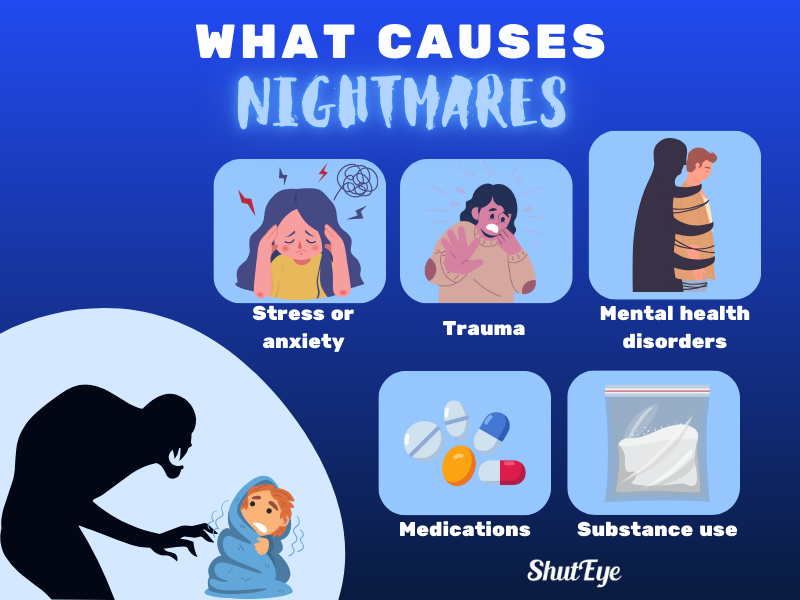


At least once in your life, you would have probably experienced a dream or a nightmare before. You may even wonder to yourself, what did that dream or nightmare mean? Was it a good sign or an omen? Let’s explore the mysteries of dreams and nightmares to satisfy your curiosity.

Dreams are a series of images created by our minds while we sleep. Sometimes, these dreams could be a product of our thoughts and emotions.
Besides visual imageries, dreams can also include using our other senses. For instance, you could dream about cooking a dish and suddenly, it seems as though you are able to smell the dish.
Unfortunately, the reason why we dream still remains a mystery. It is unclear why our brains work the way they do, to produce dreams or nightmares. But, we can still theorize why it happens.
Dr Julian’s quote: Some of the dreams we have are because the brain is trying to take new information or skills acquired during the day and make sense of them in the context of things we already know. Dreaming may also help us process emotions and work through challenging issues we have encountered during the day.
See also: Why Do We Dream?
On the other hand, nightmares are vivid dreams that are unsettling or threatening. Having nightmares often comes with feelings of intense fear, anxiety, or sadness, causing you to wake up abruptly. Nightmares tend to happen during REM sleep, similar to normal dreams.
The content of a bad dream may vary across different individuals but they typically revolve around terrifying or disturbing themes. Some symptoms of nightmares could be waking up with a pounding heartbeat or feeling sweaty. On some occasions, you may even experience sleep paralysis along with the nightmare.

Nightmares or, bad dreams may occur for several reasons. Some of the common reasons include:

There’s often a misconception that night terrors are the same as nightmares. However, this is not the case. Night terrors usually happen in the earlier stages of sleep whereas nightmares would happen in the later stages of sleep.
Not only that but night terrors are likely to be forgotten, compared to nightmares. It also affects children more than it does, adults.
Here is a table that summarizes the main differences between the two:
| Night Terrors | Nightmares |
| Affects children | Affects both children and adults |
| Occurs in the early stages of sleep (two to three hours of falling asleep) | Feelings of fear or anxiety that cause abrupt awakening |
| May scream or thrash around while eyes are open, but unaware | Likely to remember what happened in the dream |
| Happens later at night, during REM sleep |
The reason why you might be having constant nightmares may be due to unresolved issues in your daily life. For instance, not addressing the causes of your stress or anxiety directly. Major changes or traumatic experiences such as witnessing the death of a loved one could also be another reason.

Now that we’ve reached the end of this article, hopefully, it has answered all the questions that you may have about dreams and nightmares. Dreaming is a normal feature of sleep and it’s not necessarily a bad thing to have frequent dreams. However, if you experience frequent nightmares that start to affect daily function, you may have nightmare disorder.
You should seek advice from a medical professional on a suitable treatment plan. You may also keep track of any dreams or nightmares that you have, using our ShutEye® app. ShutEye® comes with a feature that allows you to record dreams.
Nightmares could be telling you something about your subconscious. It could be that your psychological needs are not being met. It could also be that there is something in your life that is making you feel frustrated or stressed.
The common kinds of nightmares that you can experience are single-occurrence nightmares, frequent nightmares, PTSD nightmares, recurring nightmares, and walking nightmares.
Akkaoui, M. A., Lejoyeux, M., d’Ortho, M. P., & Geoffroy, P. A. (2020). Nightmares in Patients with Major Depressive Disorder, Bipolar Disorder, and Psychotic Disorders: A Systematic Review. Journal of clinical medicine, 9(12), 3990. https://doi.org/10.3390/jcm9123990
John Hopkins Medicine (n.d.) Nightmares and Night Terrors [online]. Available at: https://www.hopkinsmedicine.org/health/conditions-and-diseases/nightmares-and-night-terrors
Ulrich, A. (2024) What Medications Can Cause Vivid Dreams and Nightmares? [online]. Available at: https://www.goodrx.com/drugs/side-effects/medications-that-cause-nightmares-and-disturbing-dreams

